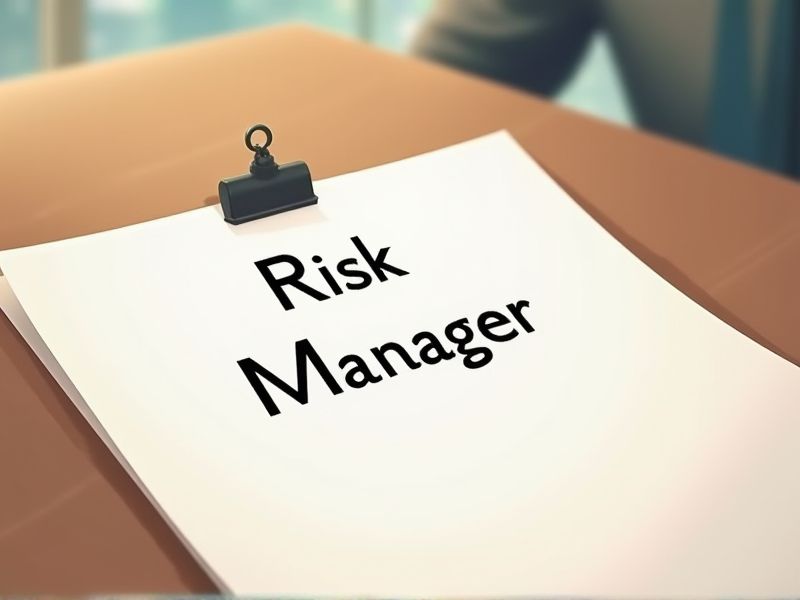
Risk Managers must navigate a complex landscape of potential threats to protect an organization's assets, necessitating a strong foundation in risk assessment and mitigation strategies. Certifications provide a standardized level of knowledge and skills recognized internationally, enhancing credibility and expertise in the field. They also keep professionals updated with the latest industry regulations and best practices, ensuring the organization's strategies remain robust and compliant. Some crucial certifications you might consider include.
Financial Risk Manager (FRM)
A Financial Risk Manager is crucial because they possess specialized expertise in identifying and assessing risks related to market volatility, credit exposure, and operational weaknesses. Their skills directly impact the decision-making process by providing data-driven insights that enhance a company's risk management framework. Without an FRM, a Risk Manager might overlook complex financial instruments and derivative products that carry hidden risks. Hiring an FRM reduces the likelihood of financial losses and regulatory non-compliance by implementing robust risk mitigation strategies.
Professional Risk Manager (PRM)
The presence of a Professional Risk Manager (PRM) certification enhances a Risk Manager's credibility by demonstrating proven expertise and understanding of complex risk management concepts. Organizations often face ever-changing and multi-faceted risks; a PRM equips Risk Managers with advanced tools and methodologies to effectively identify and mitigate these risks. Competitive markets increasingly value risk management that aligns with global standards, which a PRM-certified individual can provide. As regulatory landscapes become more rigorous, a PRM certification helps ensure that a Risk Manager is well-versed in compliance and governance requirements.
Certified Risk Manager (CRM)
Organizations face diverse risks that can impact their operations and profitability. A Certified Risk Manager (CRM) provides specialized expertise and structured methodologies to identify, assess, and mitigate these risks efficiently. Holding the CRM designation demonstrates a professional's adherence to industry standards and a commitment to ongoing education in risk management. This credibility ensures stakeholders' trust and enhances organizational resilience and strategic planning.
PMI Risk Management Professional (PMI-RMP)
Having a PMI Risk Management Professional (PMI-RMP) certification enhances a Risk Manager's ability to identify and assess risks effectively, leading to improved decision-making processes. The certification aligns with globally recognized risk management standards, giving professionals a competitive edge in managing complex project environments. Employers often prefer candidates with PMI-RMP because it demonstrates advanced expertise in risk strategy development and mitigation planning. By holding this certification, Risk Managers gain a structured approach to risk management, increasing project success rates and reducing potential losses.
Certified in Risk and Information Systems Control (CRISC)
CRISC certification equips a Risk Manager with a deep understanding of IT risk management, aligning closely with business goals. Successful CRISC certification demonstrates proficiency in identifying, assessing, and evaluating IT risks, which is critical for effective decision-making. Holding a CRISC credential establishes credibility and trust with stakeholders, essential for risk management roles. Organizations prioritize candidates with CRISC because it indicates a strategic balance of risk and opportunity, directly impacting business continuity and resilience.
Certified Information Systems Security Professional (CISSP)
CISSP provides risk managers with a comprehensive understanding of security policies, enabling them to create robust risk mitigation strategies. This certification enhances risk managers' ability to identify and assess potential threats, which is crucial in protecting organizational assets. Employers often seek CISSP-certified professionals for risk management roles due to the certification's recognition of industry-standard security knowledge. A risk manager with CISSP credentials can effectively communicate security concepts to stakeholders, facilitating informed decision-making about risk mitigation.
Certificate in Quantitative Finance (CQF)
The Certificate in Quantitative Finance (CQF) provides risk managers with advanced quantitative skills essential for analyzing complex risk factors. Understanding quantitative models enables them to predict market behaviors more accurately, leading to better risk assessment and management. CQF coursework offers exposure to the latest financial technologies and methodologies, ensuring risk managers stay updated with industry advancements. Enhanced quantitative proficiency gained from the CQF can improve decision-making processes and reduce potential financial losses.
Certified Fraud Examiner (CFE)
A Certified Fraud Examiner (CFE) is equipped with specialized skills to identify and mitigate potential fraud risks, directly benefiting a Risk Manager's strategy for safeguarding assets. CFEs bring a comprehensive understanding of financial transactions and fraud prevention controls, enabling Risk Managers to design more robust risk management frameworks. By leveraging a CFE's expertise in data analysis and fraud detection, Risk Managers can effectively reduce the likelihood of financial discrepancies. The collaboration between a CFE and a Risk Manager enhances an organization's ability to maintain compliance and protect its reputation.
Institute of Risk Management (IRM) Certificate
The Institute of Risk Management (IRM) Certificate equips risk managers with a structured understanding of risk management principles, enhancing their ability to identify and mitigate potential threats effectively. Holding the IRM Certificate often leads to increased credibility among peers and employers, making risk professionals more competitive in the job market. The certification provides exposure to global risk management standards, facilitating a more comprehensive approach to addressing risks across different industries. Employers frequently prefer certified professionals, as the certification indicates a commitment to maintaining high ethical and professional standards.
Associate in Risk Management (ARM)
Earning an Associate in Risk Management (ARM) provides essential knowledge in risk assessment, which is crucial for a Risk Manager to effectively identify potential threats. The ARM designation enhances decision-making skills by equipping Risk Managers with advanced tools for risk mitigation. Risk Managers with an ARM credential are more credible in their field, often leading to increased trust from stakeholders. The ARM curriculum covers regulatory and compliance issues, enabling Risk Managers to better align risk strategies with organizational goals.
Summary
By obtaining certifications, you enhance your credibility and expertise in risk management. Higher proficiency often leads to improved job performance and decision-making skills. This expertise could provide career advancement opportunities, potentially resulting in higher positions or salaries. Organizations tend to trust certified risk managers more, leading to increased involvement in strategic planning and operations.
